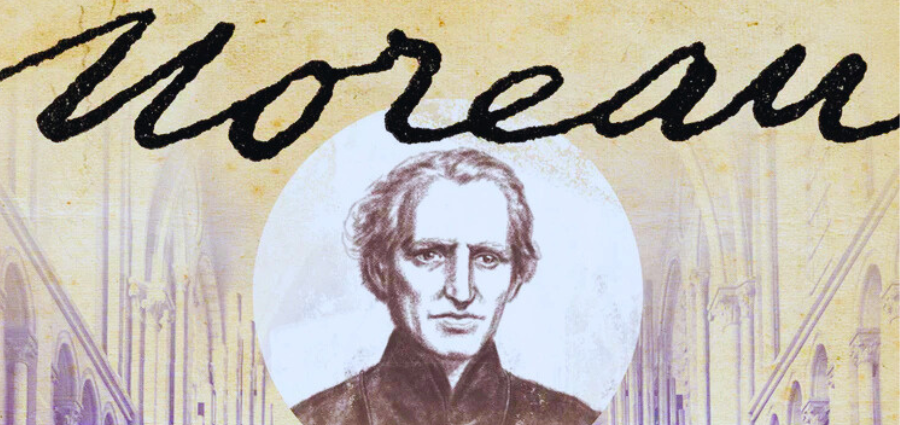
Blessed Basil Moreau: A Life of Faith and Founding
Living the Faith | Book Review | Blessed Basil Moreau
Moreau: Portrait of a Founder paints a vivid image of the life, times, and struggles of Blessed Basil Moreau and his efforts to form the Congregation of Holy Cross. The merits of this biography lie in the extensive use of primary sources from the time, in particular Blessed Moreau’s own writings, whether letters, published articles, homilies, or other such sources. The use of these sources provides a rich look into the mind of Moreau and his development spiritually. The adept narration of Fr. Barrosse, C.S.C. provides the necessary context, both historically and culturally, to better understand Blessed Moreau, while also letting Moreau speak for himself.
As mentioned, the book's greatest strength lies in its incorporation of Moreau’s own writings. Through his correspondence with family, spiritual directors, his ecclesial superiors, and many others, as well as his own private writings, we gain a deeper appreciation for the man he truly was. The mist of time are stripped away, and we hear Moreau’s very own voice. A colorful portrait of his personality is put on display for us to appreciate. The reader is blessed to see what made Moreau tick. His insecurities, goals, and the development of his interior life are laid bare, and you begin to see where the motivation for the Congregation came from. As we gain a deeper understanding of Blessed Basil Moreau, the Congregation and its charism are illuminated, and its mission becomes more distinctly defined.
Moreau's Spiritual Director
In addition to reading Moreau’s words, we are graced with the wise words of his spiritual director. These letters provide a more profound insight into the character of Moreau and the origins of his ideas. The letters from Father Mollevaut show a tenderness and care for Moreau while also providing candid critique and fraternal concern. Reading these letters shows us how truly rich Father Moreau’s interior life was. It also paints a clear picture of where Moreau’s spirituality came from. It is profoundly influenced
by the monastic spirituality of Father Mollevaut and dedication to silence, obedience, and humility. Much of Moreau's later work often traces its roots to the advice he received here, and we see its influence in the Constitutions of the Congregation of Holy Cross.
 Available from Ave Maria Press
Available from Ave Maria Press
While much of the book does consist of primary sources such as letters, there is also a good deal of narration from the author. Fr. Barrosse, C.S.C. provides adequate and detailed narration that frames the content of the primary sources well. Rather than being left to piece together what was going on in Fr. Moreau’s life, Fr. Barrosse provides the necessary context. In addition, he expands on points and offhand comments in the letters with interesting anecdotes from Morreau’s experiences. This gives the book the feel of an interesting conversation with a friend.
You receive the main narrative with amusing side notes and additional details added as needed. It helps to explain and expand on what you already learn about Moreau’s personality from his letters and the letters written to him. Some of the excerpts from the letters can reference long-standing issues Moreau had been dealing with, and it can be very easy to lose track of what is being referred to. Fortunately, Father Barrosse effectively clarifies these points and ensures the reader remains engaged with the narrative.
The Life and Times of Moreau
Moreau’s life takes center stage, as it should in his own biography, but Father Moreau’s life also happens to have coincided with some major events in world history. Some of these events would go on to inform his decision making and motivations. In particular, the various revolutions in France during Moreau’s early life, as well as the American Civil War in his later life, and a number of other wars or economic and political crises in Europe during the early to mid 1800s.
All these certainly had an effect on the early Congregation and Moreau himself, so it would be negligent to ignore them completely. Father Barrosse’s writing details many of these historical happenings and connects them well with Moreau’s lived experience. This serves to create a much more nuanced and interesting biography of Fr. Moreau.
His decisions become more comprehensible as we examine his personality, inner life, and the events that shaped him during his formative years and beyond. Not only does this provide key information about Moreau himself, but Moreau also provides a rather unique look at these moments in history! This serves the book well as it crafts a dynamic narrative that details the life of an important figure while also showing how someone from that time reacted to the things happening around him.
 Congregation of Holy Cross, CC BY-SA 3.0, via Wikimedia Commons
Congregation of Holy Cross, CC BY-SA 3.0, via Wikimedia Commons
Moreau: Portrait of a Founder is a must read for those with any connection and appreciation for the Congregation of Holy Cross and Blessed Basil Moreau. It is a dynamic and evocative look at the life and personality of Blessed Moreau and how his experiences and spirituality informed the charism of the Congregation he founded. The book provides an interesting reading experience for fans of history as well, as the reader sees how major world events impact and influence a single individual.
Overall, Moreau: Portrait of a Founder is a tremendous book for anyone interested in the history of the Congregation of Holy Cross and the life of their blessed founder, Father Basil Moreau, C.S.C.
About Stephen Driscoll
Stephen Driscoll is a graduate of Stonehill College and works for Holy Cross Family Ministries as the Family Rosary Mission Assistant. He studied History and Theology at Stonehill and still enjoys learning as much as possible about both subjects. Stephen is an ardent Bruins fan and a lover of all things New England.

